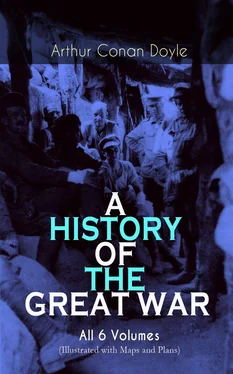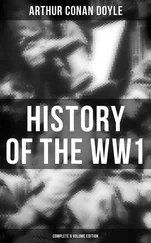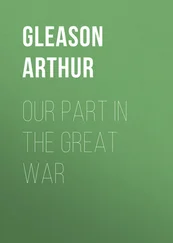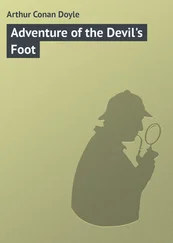The leaders of the Unionist party, Lord Lansdowne and Mr. Bonar Law, had already, on August 2, signified to the Government that they considered Britain to be honour-bound to France, and would support without hesitation every practical step to give effect to the alliance. Fortified by this assurance, the Government could go strongly forward. But after the Belgian infraction, its position was that of the executive of a united nation. Sir Edward Grey’s analysis in Parliament of the causes which had brought us to war convinced the reason and claimed the sympathy of every political party, and even the most fervent advocates of peace found themselves silenced in the presence of the huge German aggression which could never admit of a peace founded upon mutual respect and equality, but only of that which comes from ascendancy on the one side and helplessness upon the other.
Should Britain ever be led into an unjust war, she will soon learn it from the fearless voices of her children. The independent young nations which are rising under the red-crossed flag will not be dragged, in the train of the Mother-Country, into any enterprise of which their conscience does not approve. But now their assent was whole-hearted. They were vehement in their approval of the firm stand made for the pledged word of the nation. From every quarter of the world deep answered deep in its assurance that the sword should not be sheathed until the wrong was righted and avenged.
Strong, earnest Canada sent her 30,000 men, with her promise of more. Fiery Australia and New Zealand prepared as many, Maori vying with white man in his loyalty to the flag. South Africa, under the splendid leadership of Botha, began to arm, to speak with the foe in her own gates. India poured forth money and men with a lavish generosity which can never be forgotten in this country. The throb of loyalty to the old land passed through every smallest Dependency, and then beyond the frontier to those further lands which had known us as a just and kindly neighbour. Newfoundland voted a contingent. Ceylon sent of her best. Little Fiji mustered her company of fighting men, and even the mountains of Nepaul and the inaccessible plateaux of Thibet were desirous of swelling that great host, gathered from many races, but all under the one banner which meant to each a just and liberal rule.
On the very eve of the outbreak of hostilities one man was added to the home establishment whose presence was worth many army corps. This was Lord Kitchener, whose boat was actually lying with steam up to bear him away upon a foreign mission, when, at the last instant, either the universal public demand or the good sense of the Government recalled him to take supreme charge of the war. It was a strange and a novel situation that a soldier who was no party politician should assume the role of War Minister in a political Cabinet, but the times called for decided measures, and this was among them. From that day onwards until the dark hour which called him from his uncompleted task the passer-by who looked up at the massive front of the War Office was gladdened by the thought that somewhere in the heart of it those stern, immutable eyes were looking out at Britain’s enemies, and that clear, calculating brain was working for their downfall. Slow, safe, methodical, remorseless, carefully preparing the means at every stage that led him to the distant but preordained end, he had shown, both in the Soudan and South Africa, that the race of great British generals was not yet extinct. He knew and trusted his instrument even as it knew and trusted him.
That instrument was an army which was remarkably well prepared for its work. It cannot be said that the Boer War had increased the prestige of the British forces, though only those who have studied the subject can realise how difficult was the task with which they were then faced, or how considerable an achievement it was to bring it to a success. But the campaign had left behind it a valuable legacy, all the richer because so great a proportion of the land forces had been drawn into the struggle. In 1914 a large proportion of senior officers and a considerable number of non-commissioned officers and reservists had passed through that ordeal, and learned by experience what can be done, and, even more important, what cannot be done, in face of modern rifles in skilful hands.
The lesson had been well pressed home after the war, and every general, from Lord Roberts downwards, had laid emphasis upon the importance of cover and of accuracy of fire. Apart from the sound technical training of the soldiers, the administration of the Army had, after an experimental period, fallen into the hands of Lord Haldane, who has left his mark more deeply than any one since Cardwell upon the formation of the land forces. A debt of gratitude is owing to him for his clear thought and his masterful dispositions. Had he been a prophet as well as organiser, he would no doubt have held his hand before he made the smallest decrease of our regular forces; but, on the other hand, by turning our haphazard, amateurish volunteers into the workman-like Territorials, in forming the invaluable Officers’ Training Corps which tapped our public schools for something better than athletic talent, and in rigidly defining our expeditionary corps and providing the special reserves for its reinforcements, he did work for which he can never adequately be thanked. The weapon which he had fashioned was now thrust into the strong right hand of the new Minister of War.
It is well to survey this weapon before we show how it was used. The total personnel of the Army with its reserves called up was about 370,000 men. Of this 160,000 were set aside as an expeditionary force, but only a portion of this number could be counted as immediately available on the outbreak of war, though the system of mobilisation had been brought to a fine point. It was hoped that three army corps numbering about 110,000 men, with two divisions of cavalry, about 10,000 horsemen, would be immediately available, petty numbers as compared with the millions of the Continent, but highly trained professional soldiers, capable, perhaps, of turning the balance in the clash of equal hosts. The rest of the Regular Army had to provide garrisons for India, Egypt, Gibraltar, and other dependencies, but it was hoped that in time nearly all of it would be available for service.
Behind these first-line troops was the special reserve, something under 100,000 in number, who were the immediate reinforcements to fill the gaps of battle. Next in order came the Territorials, whose full complement was 340,000 men. Unhappily at this time they were nearly 100,000 under strength, and there are many who think that if the National Service League in their earnest campaign, which was inspired by a clear vision of the coming danger, had insisted upon a great enlargement of this constitutional force, instead of agitating for a complete change which presented practical and political difficulties, their efforts would have been more fruitful. These troops were raw, inexperienced, and only enlisted for home service, but with a fine spirit they set to work at once to make themselves efficient, and the great majority signified their readiness to go anywhere at the country’s call. Many brigades were sent abroad at once to relieve the regulars in Egypt and India, while others were ready to join the fighting line on the Continent after a few months, where, as will be shown, they acquitted themselves remarkably well. The enthusiasm for the war rapidly sent the numbers of the Territorials up to nearly half a million. In addition to these troops there was the promise of 70,000 highly trained men (one quarter of whom were British regulars) from India. Canada, Australia, and New Zealand came forward to offer some 60,000 men between them, with the promise of as many more as should be called for. Brave and hardy, these were splendid raw material, though their actual technical training was not, save in some special corps, more advanced than that of the British Territorials. Altogether, the British War Lord could see, at the very beginning of hostilities, nearly 1,000,000 of men ready to his hand, though in very different stages of efficiency.
Читать дальше












